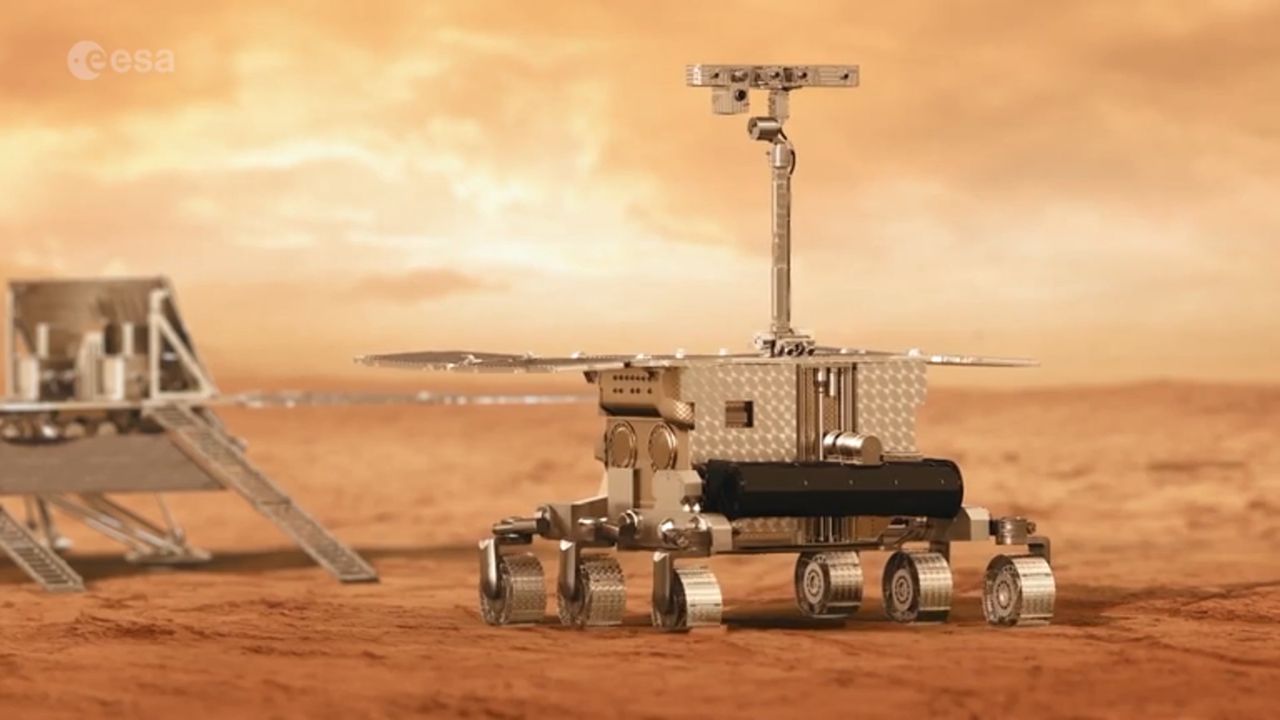
News
September 20, 2025
Landing site for Rosalind Franklin rover may be ripe with clues about ancient Mars life
Natural geologic processes at Mars' Oxia Planum may improve the Rosalind Franklin rover's chances of detecting organic compounds.
**Oxia Planum: A Martian Hotspot for Life's Building Blocks?**
The search for life on Mars is about to get a significant boost. Scientists believe that Oxia Planum, the planned landing site for the European Space Agency's (ESA) Rosalind Franklin rover, might be particularly promising for finding evidence of past Martian life. New research suggests that natural geological processes in this region could have concentrated and preserved organic compounds, the building blocks of life, making them easier for the rover to detect.
The Rosalind Franklin rover, part of the ExoMars mission, is equipped with a drill capable of boring up to two meters below the Martian surface. This is crucial because the harsh radiation on the surface of Mars can break down organic molecules, making them difficult to find. By digging deeper, the rover can access more protected areas where these compounds might have survived for billions of years.
What makes Oxia Planum so special? Scientists believe that the region's history of water activity played a critical role. Billions of years ago, Oxia Planum was likely a vast floodplain, rich in clay minerals formed by the interaction of water and rock. These clay minerals are known for their ability to trap and preserve organic molecules, acting like a kind of molecular sponge.
Furthermore, researchers suggest that the ancient Martian environment at Oxia Planum may have experienced periodic flooding and evaporation cycles. These cycles could have concentrated organic compounds in specific areas within the clay-rich sediments. Imagine a coffee stain forming on a table as the liquid evaporates – a similar process could have occurred on Mars, leaving behind concentrated deposits of organic material.
The Rosalind Franklin rover's suite of scientific instruments is designed to analyze these deposits and identify any organic molecules present. If the rover detects these compounds, it would be a major step forward in our understanding of whether life ever existed on Mars. While the discovery of organic molecules wouldn't definitively prove the existence of past life, it would provide strong evidence that the necessary ingredients for life were present on the Red Planet.
The ExoMars mission, with the Rosalind Franklin rover at its heart, is a testament to international collaboration in the pursuit of scientific discovery. The mission aims to address one of the most fundamental questions in science: are we alone in the universe? The unique geological environment of Oxia Planum offers a tantalizing opportunity to find clues that could help answer this question. The world eagerly awaits the rover's findings as
The search for life on Mars is about to get a significant boost. Scientists believe that Oxia Planum, the planned landing site for the European Space Agency's (ESA) Rosalind Franklin rover, might be particularly promising for finding evidence of past Martian life. New research suggests that natural geological processes in this region could have concentrated and preserved organic compounds, the building blocks of life, making them easier for the rover to detect.
The Rosalind Franklin rover, part of the ExoMars mission, is equipped with a drill capable of boring up to two meters below the Martian surface. This is crucial because the harsh radiation on the surface of Mars can break down organic molecules, making them difficult to find. By digging deeper, the rover can access more protected areas where these compounds might have survived for billions of years.
What makes Oxia Planum so special? Scientists believe that the region's history of water activity played a critical role. Billions of years ago, Oxia Planum was likely a vast floodplain, rich in clay minerals formed by the interaction of water and rock. These clay minerals are known for their ability to trap and preserve organic molecules, acting like a kind of molecular sponge.
Furthermore, researchers suggest that the ancient Martian environment at Oxia Planum may have experienced periodic flooding and evaporation cycles. These cycles could have concentrated organic compounds in specific areas within the clay-rich sediments. Imagine a coffee stain forming on a table as the liquid evaporates – a similar process could have occurred on Mars, leaving behind concentrated deposits of organic material.
The Rosalind Franklin rover's suite of scientific instruments is designed to analyze these deposits and identify any organic molecules present. If the rover detects these compounds, it would be a major step forward in our understanding of whether life ever existed on Mars. While the discovery of organic molecules wouldn't definitively prove the existence of past life, it would provide strong evidence that the necessary ingredients for life were present on the Red Planet.
The ExoMars mission, with the Rosalind Franklin rover at its heart, is a testament to international collaboration in the pursuit of scientific discovery. The mission aims to address one of the most fundamental questions in science: are we alone in the universe? The unique geological environment of Oxia Planum offers a tantalizing opportunity to find clues that could help answer this question. The world eagerly awaits the rover's findings as
Category:
Technology